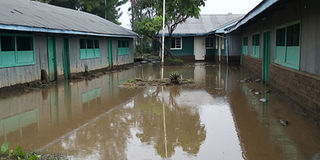
A flooded school in Nairobi.
The indefinite postponement of schools reopening was informed by data collected by regional officials over the past one week on the status of the institutions and projections by the Meteorological Department.
According to the data submitted by county and regional directors of education, infrastructure in a number of schools have been damaged by the heavy rains pounding the country, especially sanitation facilities, making it difficult for learning to resume.
President William Ruto Friday directed that the reopening be postponed “until further notice”.
This came just three hours after the Cabinet Secretary for Education Ezekiel Machogu had issued a circular confirming schools would reopen on Monday next week and issued guidelines to be followed by schools and parents.
According to Mr Machogu, after further consultations, the President decided to postpone the reopening of schools. In his address to the nation, Dr Ruto noted that transportation across the country has become challenging due to flooded and damaged roads, bridges and overflowing dams and rivers.
“We’re not pointing to any given date because we don’t know.
The situation is not good and it’s worsening every day. We don’t have to risk our children and the President has communicated in good time,” Mr Machogu told Nation.
According to a press release by the Ministry of Interior, a total of 33,100 households have been displaced affecting approximately 165,500 people and infrastructure in 1,967 schools destroyed by the floods.
The ministry said that 115 camps have been set up across 19 counties for 27,586 people who have been displaced by the floods.
Some schools are being used to accommodate the displaced people. President Ruto said that the rains have so far claimed the lives of 210 people and that Meteorological reports project that the rains will increase in intensity and duaration, probably beyond this month. This would lead to further damage.
However, Mr Machogu revealed that the Ministry of Education (MoE) does not have funds allocated for emergency response and affected schools will depend on the largesse of members of Parliament who control the National Government Constituency Development Fund (NGCDF).
“MoE doesn’t have emergency allocation but the NG-CDF has a component of emergency of their allocation (seven per cent) but in a situation like this, they can use more,” Mr Machogu said.
The President also requested MPs to re-organise their NG-CDF allocations to prioritise the reconstruction of school infrastructure that has been damaged as a result of the floods.
After the postponement by the President, Mr Machogu issued another circular, the second for the day, directing that learners who had already reported to schools to be retained there unless it is safe for them to return home.
The chair of the Kenya Secondary Schools Heads Association Willy Kuria told Nation that the most affected infrastructure are latrines and toilets, posing a health risk to learners and staff.
He called for assistance for schools to get ready to open.
“This is nature and the government has no control but schools don’t have money for disaster preparedness, and even what they get as fees and capitation isn’t enough. There should be an assessment to identify the ones that need assistance,” he said.
The chair of the National Parents Association, Silas Obuhatsa urged caution on reopening of schools. “Before then, parents should visit schools in the company of Boards of Management and heads of the institutions to carry out assessment and confirm that they are safe for reopening.
If according to their assessment, the conditions cannot allow the reopening, learners should stay at home until it’s safe,” he said.
Mr Kuria said that learning is going on in some schools where learners, especially Form Fours had reported before the first postponement.
“Of course some learners who are at home will be disadvantaged. For my school [Murang’a High, if this goes beyond next week, I’ll jump-start online learning. I advice other schools to go online too,” he said.
The Kessha boss suggested that if the terms dates are affected significantly, the terms should be reorganised and holidays shortened, especially the end of year one which is usually two months.
The secretary-general of the Kenya Union of Post Primary Education Teachers Akello Misori said that although teachers are aware of the unpredictability of flooding, “there’s confusion and lack of coordination in government communication”.
“We understand not all parts of the country are affected but it would be unfair to reopen schools while some learners can’t access schools or are even homeless. We recommend a stakeholder engagement on the matter because it has interfered with the term dates,” Mr Misori said.
He called on the government to assess the situation and take measures to protect learners, teachers and other members of school communities.
Mr Machogu has directed schools boards of management to submit reports regarding the status of their schools to the county education boards.
The reports should detail matters such as damage caused to infrastructure by rain and mitigation measures. The reports should be submitted by May 8.
In turn, the county boards of education to assess the situation in their respective areas and submit reports to the CS by May 10.









